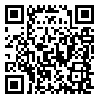BibTeX | RIS | EndNote | Medlars | ProCite | Reference Manager | RefWorks
Send citation to:
URL: http://erj.khu.ac.ir/article-1-38-en.html
The aim of this research was evaluating the competencies of trainers and
labor-coaches of “Education with Production” outside of the “Work and
Knowledge Centre” in Kermanshah province. The research method used was
survey. The statistical population consisted of 20 managers and experts from
education office and technical schools, and 135 students whom they used the
"Education with Production" service in Kermanshah province. Based on
Krejcie and Morgan table, 19 people from the first group, and 102 people from
the second group were selected randomly as the statistical sample. Based on
internationally related available researches, scientific documents, qualitative
analysis, and also, by referring to the experts, trainers’ and labor-coaches’
competencies were classified with three ranges: personal competencies,
professional-technical competencies (with the components of knowledge,
insight, and skill), and ethical-belief competencies (with the components of
work commitment, development of ability, social moderation, social
relationships, bureaucratic discipline, and inner faith). Then, based on these
ranges, the questionnaires were prepared. Based on descriptive and inferential
analysis, total average of all of the competencies was high and significant. It
was in the rate of moderate or lower in the following items: applying the
suitable methods of teaching, proving the plan of proper task and updated
information from the journals, utilizing computer and software related to the
skills training, collaboration with school counselors, trying to upgrade and
update their knowledge and skills, and others, exchange of professional
knowledge and information, paying attention to the needs of students and their
individual differences, reporting students’ disciplinary issues, reading and
observing the principles and related standards.
Received: 2016/05/3 | Revised: 2022/12/4 | Accepted: 2016/05/3 | ePublished: 2016/05/3
| Rights and permissions | |
 |
This work is licensed under a Creative Commons Attribution-NonCommercial 4.0 International License. |




